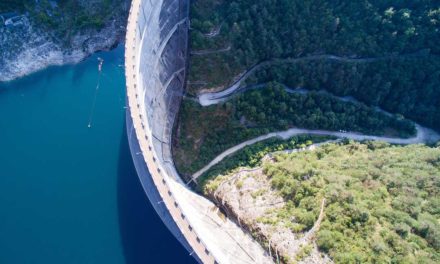Urban Institute Midterm Evaluation Report Finds 100RC – A Grantee Of The Rockefeller Foundation – Is Helping Cities Break Down Internal Silos, And Move Towards More Effective Resilience Building Efforts
New York City – The Urban Institute, with financial support from The Rockefeller Foundation, today released an independent report of midterm findings showing that 100 Resilient Cities (100RC) , in the five years since its creation, is making important progress in helping urban areas around the world institutionalize and build resilience to a wide range of shocks and stresses. The report, completed by the Urban Institute as part of its multi-year evaluation of 100RC, finds that member cities are widely adopting holistic resilience planning practices and “de-siloing” city operations to tackle social, economic, and physical challenges of the 21st century. Moreover, the analysis found 100RC is among the first global urban initiatives to employ a consistent set of tools, supports, and resources across so many diverse cities for which no alternative exists.
“I’m excited about Urban’s involvement in this unique global experiment—the first and only that attempts to build resilience in city institutions in such a wide number of cities around the world,” said Sarah Rosen Wartell, President of the Urban Institute. “We know from our research how important it is to build capacity in city governments to foresee challenges, involve citizens, and provide equitable services. These goals require time and commitment and, as this midterm report shows, both are showing signs of paying off.”
“It is extraordinarily exciting to see the impact 100RC has made over the last five years laid out in such detail by an independent evaluator,” said Michael Berkowitz, President of 100RC. “This report shows both that that our cities making progress, and that the global movement of resilience is gaining steam and changing institutions and planning processes around the world. From here, we’re looking forward to taking the lessons we’re learning and using them to improve our efforts even further.”
Resilience is the practice of looking at a city holistically: understanding the systems that make up the city, including the interdependencies and risks they may face. By strengthening the underlying fabric of a city and better understanding the potential shocks and stresses it may face, a city can improve its development trajectory and the well-being of its citizens. Read more about what the practice of resilience includes here. Case studies on city impact, produced by 100RC, can be found here.
The report is part of the ongoing independent assessment of 100RC by Urban Institute and its global partners – C230 Consultores, Ricardo Energy and Environment, Oxfam UK, and Zerihun Associates – to measure the effectiveness of the organization in building a global practice of resilience through structural changes in city functions. The 100RC organization, which spans six continents and more than 40 countries, was launched by the Rockefeller Foundation in 2013 to help cities better understand their challenges and then develop and execute comprehensive and integrated solutions. More on 100RC can be found here.
Since 100RC’s launch, cities have hired 83 Chief Resilience Officers and released 49 resilience strategies, securing more than $3.35 billion in external funding for urban planning projects through these efforts.
Focusing on a core sample of 21 member cities, the report takes an in-depth look at how cities are using their 100RC membership to initiate fundamental changes in their planning, their city government functions, and ultimately, their implementation of built, environmental, and social actions.
Key findings include:
- Membership in 100RC helps cities institutionalize resilience: Findings suggest 100RC is contributing positively to six key areas of interest in its member cities by embedding resilience principles in city planning and operations. These six areas of positive change include: the explication of resilience in city planning; the internal consistency across cities’ various planning documents; the establishment of a Chief Resilience Office or similar cross-sectoral coordinator; a reduction in the strength of the government silos that promote ineffective solutions, duplication, and inefficiency; better collaboration across city, state, and national levels of government; and changes to budgetary review procedures or leveraged funds for resilience-building efforts which may ultimately lead to more efficient and effective use of city funds.
- 100RC helps cities implement solutions: Just over half the sample has published Resilience Strategies in partnership with 100RC. Cities report helpful guidance from 100RC in ensuring that their Strategy initiatives are developed by consensus, are feasible, and are expected to deliver multiple resilience benefits for residents. Critically, cities that published their strategies are identifying and implementing their priority initiatives – indicating the strategies are being enacted and not just sitting on a shelf. Tracking the completion and outcomes of these initiatives will be a focus of future evaluation efforts. Early observations suggest that cities that have more fully institutionalized changes (e.g. have made the CRO position/office permanent) are doing more to implement their strategy’s initiatives. Put simply, early findings suggest that building resilience into a city’s DNA allows it to accomplish more.
- 100RC’s model has a unique breadth and depth of engagement: 100RC consciously employs a consistent set of core offerings that are then tailored to each member city’s context and pace. The Urban Institute’s analysis compared 100RC to 40 other programs, finding that alternatives to this effort – to mount a coordinated, city-driven effort to plan for worldwide resilience challenges – simply do not exist. 100RC is among the first global urban initiatives to employ a consistent set of tools, supports, and resources across so many diverse cities. It is also the first of its size to have the explicit mission of building city-level resilience. Most comparable programs have focused directly on projects or services, while 100RC’s theory of change focuses on the long-term transformation of institutions and systems in cities as a precursor to project implementation.
- Lessons from 100RC have spread beyond the 100RC network: Chief Resilience Officers (CROs) are regularly in discussions with non-member cities, helping those cities learn and implement best resilience practices. 100RC’s network of CROs have also become champions within the broader global resilience movement, facilitating a transition to viewing shocks and stresses citizens face in a holistic and integrated fashion.
As part of the grant agreement with The Rockefeller Foundation, the 100RC evaluation will continue through 2022, as more cities release their Resilience Strategies and implement their initiatives. The Urban Institute team will continue to collect data on the sustainability of institutional changes in the sample cities, but will also begin a series of case studies as initiatives develop, evolve, and begin to bear benefits to member cities and their citizens.
Key 100RC Network Facts
• 100 Resilient Cities operates on 6 continents, in 47 countries, and in 21 languages
• 83 Chief Resilience Officers have been hired or appointed by mayors and currently hold their position
• 49 resilience strategies have been completed and released
• Many cities begin implementing their strategies almost immediately upon completion
• In the Urban Institute study, seven cities with recently approved strategies reported 55% of their collective proposed initiatives as completed or underway
• Cities hire an average of 4 additional full time employees for their resilience office
• Fifty-nine CROs and offices have continued their work through political transitions
• Across the globe, $3.35 billion have been catalyzed for resilience projects and initiatives
• In North America alone, that figure is $1.22 billion
• Most common shocks: rainfall flooding, infrastructure failure, disease outbreak
• Most common stresses: aging infrastructure, inadequate public transportation, lack of affordable housing
About 100 Resilient Cities—Pioneered by The Rockefeller Foundation
100 Resilient Cities – Pioneered by The Rockefeller Foundation (100RC) helps cities around the world become more resilient to social, economic, and physical challenges that are a growing part of the 21stcentury. 100RC provides this assistance through: funding for a Chief Resilience Officer in each of our cities who will lead the resilience efforts; resources for drafting a resilience strategy; access to private sector, public sector, academic, and NGO resilience tools; and membership in a global network of peer cities to share best practices and challenges. For more information, visit: www.100ResilientCities.org.
About The Rockefeller Foundation
For more than 100 years, The Rockefeller Foundation’s mission has been to promote the well-being of humanity throughout the world. Today the Foundation is focused on securing the fundamentals of human well-being—health, food, power, and jobs—to ensure every family experiences dignity and opportunity in our rapidly urbanizing world. Together with partners and grantees, The Rockefeller Foundation strives to catalyze and scale transformative innovations, create unlikely partnerships that span sectors, and take risks others cannot—or will not. For more information, please visit www.rockefellerfoundation.org.
About the Urban Institute
The nonprofit Urban Institute is a leading research organization dedicated to developing evidence-based insights that improve people’s lives and strengthen communities. For 50 years, Urban has been the trusted source for rigorous analysis of complex social and economic issues; strategic advice to policymakers, philanthropists, and practitioners; and new, promising ideas that expand opportunities for all. Our work inspires effective decisions that advance fairness and enhance the well-being of people and places.




